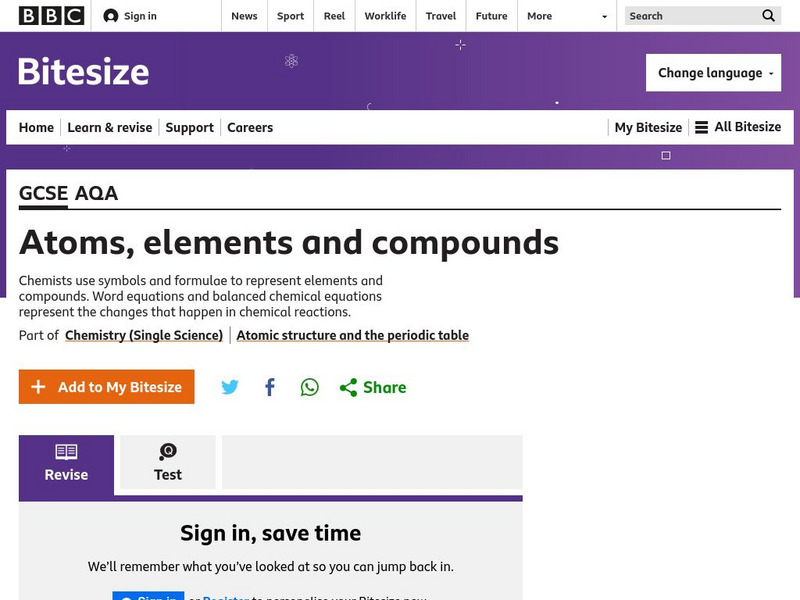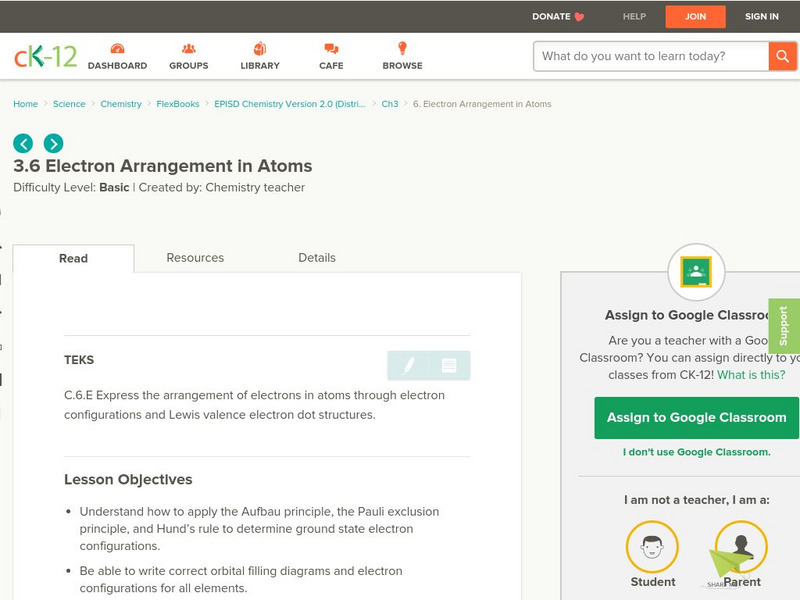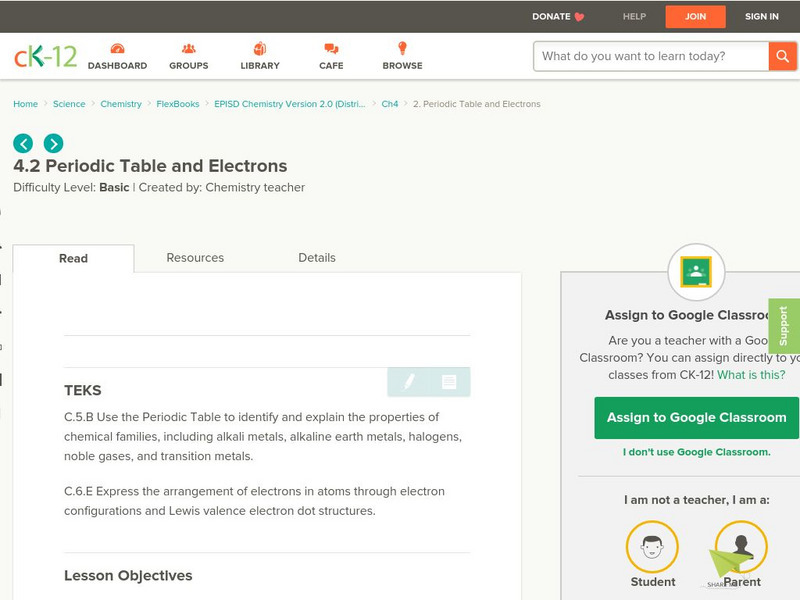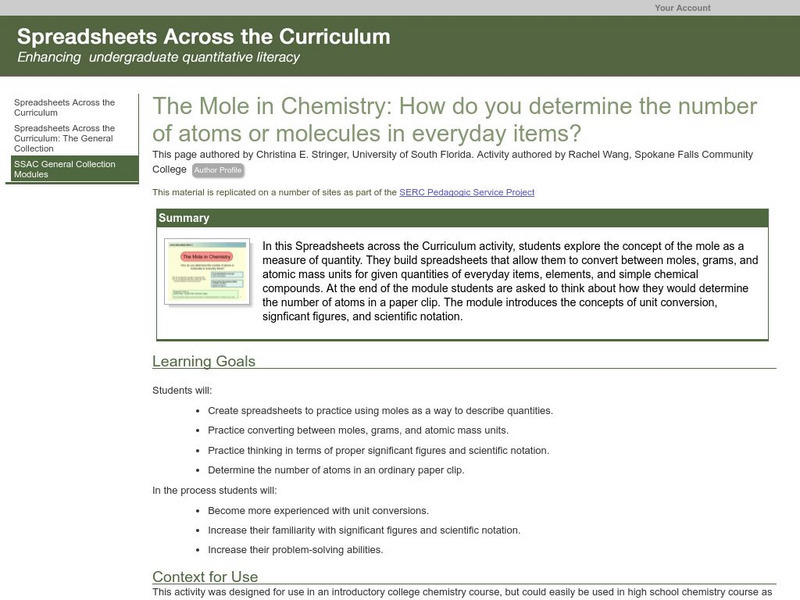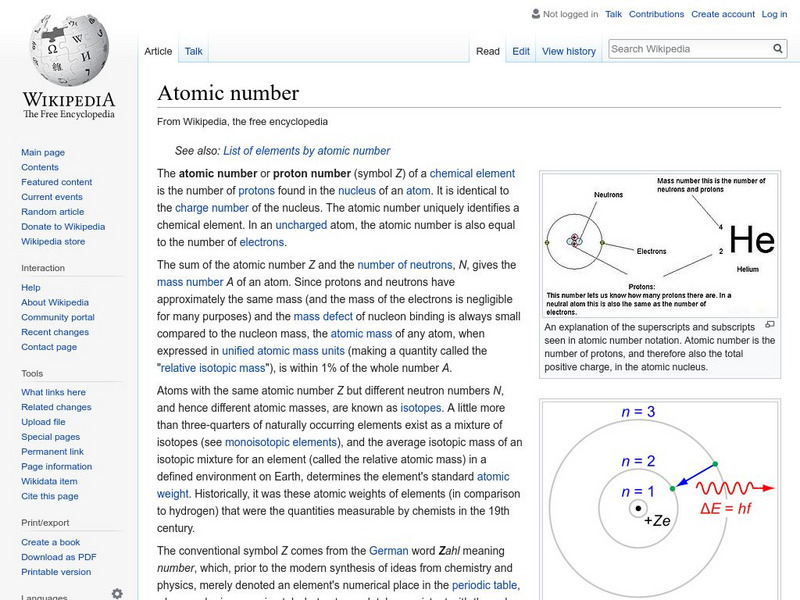Hi, what do you want to do?
American Chemical Society
American Chemical Society: Hompage
ChemCenter, available from the American Chemical Society, provides chemistry news, reference sources and other public services.
PBS
Pbs Learning Media: Periodic Table of the Elements
This interactive periodic table developed for Teachers' Domain provides detailed information about the chemical properties of elements and illustrates the electron configurations that determine those characteristics.
PBS
Pbs Learning Media: Periodic Table of the Elements Essay
This essay, written for Teachers' Domain, describes the foresight and pattern recognition that Russian chemist Dmitri Mendeleyev used to develop the modern periodic table of elements.
BBC
Bbc: Gcse Bitesize: Atoms, Elements and Compounds
This lesson focuses on atoms and elements including what they are, the chemical symbols for elements, and the placement of elements on the periodic table. A link to a test is provided.
Thomas Jefferson National Accelerator Facility
Jefferson Lab: Periodic Elements Memorization Game
How much do you know about the chemical elements? This game will challenge you with questions about chemical symbols, names and atomic numbers.
CK-12 Foundation
Ck 12: Electron Arrangement in Atoms
[Free Registration/Login may be required to access all resource tools.] In the following online tutorail students will learn how to express the arrangement of electrons in atoms through electron configurations and Lewis valence electron...
Soft Schools
Soft Schools: Periodic Table
This interactive periodic table of elements allows students to click on each element, and read essential information about that element. Chemical elements are also listed alphabetically for quick reference.
BBC
Bbc: Gcse Bitesize: What Does the Periodic Table Tell Us About the Elements?
The number of protons in the atom of an element determines its place in the Periodic Table. The number of electrons in an atom is the same as the number of protons. These electrons are arranged in shells or 'energy levels' around the...
Simon Fraser University
Chem1 Virtual Textbook: Chemical Composition
Chemical composition is a section of a larger overview on Chemistry, covering a variety of aspects. This section focuses on elements, atoms, compounds, and structure. Examples, formulas, and pictures are provided.
CK-12 Foundation
Ck 12: Life Science: 2.1 Elements and Compounds
Learn how basic elements form molecules to support life.
Museum of Science
The Atom's Family: Mighty Molecules
In this activity, students construct models of molecules using marshmallows and gum drops.
CK-12 Foundation
Ck 12: Electron Configuration and the Periodic Table
[Free Registration/Login may be required to access all resource tools.] In the following online tutorial students will sse the Periodic Table to identify and explain the properties of chemical families, including alkali metals, alkaline...
Science Education Resource Center at Carleton College
Serc: The Mole in Chemistry: Determining the Number of Atoms in Everyday Items
Students explore the concept of the mole as a measure of quantity. They build spreadsheets that allow them to convert between moles, grams, and atomic mass units for given quantities of everyday items, elements, and simple chemical...
Ducksters
Ducksters: Chemistry for Kids: Chemical Bonding
Study chemical bonding in chemistry including atoms, valence electrons, ionic and covalent bonding, and how molecules are formed on this site!
Ducksters
Ducksters: Chemistry for Kids: Naming Chemical Compounds
Learn about naming chemical compounds in chemistry including conventions, the order of the elements, metals, non-metals, acids, and examples on naming on this site.
Ducksters
Ducksters: Chemistry for Kids: Chemical Reactions
A site discussing chemical reactions in chemistry including reaction rate, types of reactions, reagents, reactants, catalysts, and inhibitors.
Ducksters
Ducksters: Chemistry for Kids: Chemical Mixtures
Explore all about chemical mixtures on this site including solutions, alloys, suspensions, colloids, dissolving, examples, and facts.
Ducksters
Ducksters: Chemistry for Kids: Soaps and Salts
Kids learn about soaps and salts in chemistry including interesting facts, how soap is made, how soap works, and what are salts in this site.
ClassFlow
Class Flow: What Is Matter?
[Free Registration/Login Required] Discover the composition of matter and the relationship between matter, atoms, and elements. Students will learn the differences between elements and compounds, and how molecules are formed. Chemical...
Wikimedia
Wikipedia: Atomic Number
Wikipedia provides the definition of the term, "Atomic number," a term used in chemistry and physics to represent the number of protons in the nucleus of an atom.
Simon Fraser University
Chem1 Virtual Textbook: Electronegativity
Acting as a subtopic of the General Chemistry Virtual Textbook's section on Atoms and the Periodic Table, this site discusses shared chemical bonds between two elements resulting in electronegative and electropositive outcomes.
University of Alberta
The University of Alberta: Nmr Spectroscopy
1HNMR theory begins in the nucleus of hydrogen. Complete this tutorial on the 1HNMR spectrum graph to learn about the number of equivalent hydrogens, b) the chemical environment of each hydrogen type and c) the number of neighbouring...
Ducksters
Ducksters: Chemistry for Kids: Famous Chemists
Get some information about some famous chemists who made impacts on their fields! These scientists helped to develop the laws of chemistry and discovered many of the elements.
Sophia Learning
Sophia: Science Tutorial: Matter
Created to teach students of the 21st century, SOPHIA is bringing matter straight to your fingertips. Become the commander of your own learning experiences as you take part in this interactive tutorial. [1:02]







